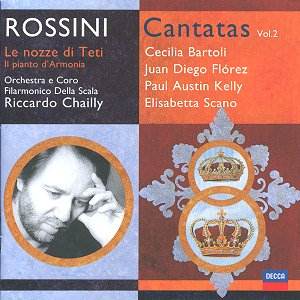ROSSINI CANTATAS Vol.
2
Gioacchino ROSSINI
Le nozze di Teti, e di Peleo (1)
Il pianto d'Armonia sulla morte di Orfeo
(2)
 Elisabetta Scano (soprano)
(1), Cecilia Bartoli (mezzo-soprano) (1), Daniela Barcellona (contralto)
(1), Juan Diego Flórez (tenor) (1), Luigi Petroni (tenor) (1),Paul
Austin Kelly (tenor) (2)
Elisabetta Scano (soprano)
(1), Cecilia Bartoli (mezzo-soprano) (1), Daniela Barcellona (contralto)
(1), Juan Diego Flórez (tenor) (1), Luigi Petroni (tenor) (1),Paul
Austin Kelly (tenor) (2)
La Scala Philharmonic Choir and Orchestra/Riccardo Chailly
Recorded 1997 (2), 1998 (1),
Milan
 DECCA 466
328-2
DECCA 466
328-2
Crotchet
AmazonUK
AmazonUS
Amazon
recommendations

Rossini's earliest orchestral cantata, Harmony's Lament on the Death of
Orpheus, written when he was sixteen, is coupled with a mature and sizeable
piece just post-dating Il Barbiere di Siviglia. These cantatas come
from a substantial series, essentially occasional works commissioned for
weddings and the like, and the composer himself probably never expected them
to get a second performance. What could have proved a classic piece of hack-work,
with composer and interpreters alike on automatic pilot, turns out to be
much more, thanks to a lot of trouble on the part of all concerned. From
Rossini himself in the first place. His orchestration is unfailingly colourful
and inventive, not only in the mature piece, which has, for instance, a
well-worked-out flute solo in Peleo's main aria, but also in the schoolboy
one. A virtuoso horn obbligato and a striking solo for the cello are moments
that stand out. The invention is unflagging if not generally top-notch Rossini
- that is to say it carries one along infectiously without leaving specific
tunes in the mind with a notable exception. Given the ephemeral nature of
the pieces Rossini made no bones about lifting bits of unsuccessful previous
operas, or re-utilising the best bits in later works. All these borrowings
are fully documented in Philip Gossett's excellent notes yet the surprise
factor remains high when a very well-known tune indeed suddenly turns up,
prompting the feeling, however, that one has heard it sung with much more
style elsewhere. More of this in a moment.
Much trouble has also been taken by Chailly, who is perky and gentle as required
and obtains a good response from the Milan forces. I did feel, though, that
these forces might profitably have been slimmed down a little, especially
in Le nozze di Teti, which was recorded in the small theatre acoustic
of Milan's Piccolo Teatro. The other work was recorded in the Great Hall
of the Milan Conservatoire, where the numbers fit more naturally.
Another example of the care taken is in the differentiation of the two tenors
in Teti, where Luigi Petroni as Jove has a heroic, baritonal quality
(but with a real tenor ring) while Flórez's lighter tones have a plausible
young-man-just-about-to-be-married air. However, it is here that things begin
to come unstuck, for while Petroni is an excellent singer Flórez's
high notes (which include plenty of Cs and even a D) sound severely strained
and severely limit one's enjoyment of his work. Paul Austin Kelly, in the
other cantata, is a light tenor of much sounder schooling and gives considerable
pleasure, without ever quite convincing me that nature intended him to sing
up there. Compare them both with Elisabetta Scano. Here is an attractive
light soprano voice whose secure and seemingly effortless emission seems
totally natural. She is also a very musical singer and her contributions
to the various duets and ensembles (she has no actual aria, alas) are enjoyable
without reservation. I look forward to hearing more from her, with one proviso:
she must learn how to handle recitative. She has two here and they have about
as much expressiveness as a shopping list.
Daniela Barcellona's contributions are small and make no particular impression,
which leaves us with the disc's other problem area. But no, surely it can't
be… Well, I can only speak for my own ears, and the breathiness of Cecilia
Bartoli's delivery in her first appearance sent my eyebrows up immediately.
As the performance went on I came to feel that her eager-girl-with-flashing
eyes delivery, infectious as it was when she first hit the scene, has by
now turned into a very mannered act indeed. And then my dear, her vibrato!
It never was the steadiest of voices but now it's practically impossible
to tell when the vibrato leaves off and a trill begins. Of course there are
compensations in the gutsy conviction she brings to everything, but if her
decline is not to be as meteoric as her ascent to the stars she had better
give her vocal machinery a complete overhaul.
Still, she doesn't actually have a lot to do and, since neither cantata is
likely to be recorded again in a hurry, listeners are advised to snap up
two performances whose hearts are in the right place.
Christopher Howell.

